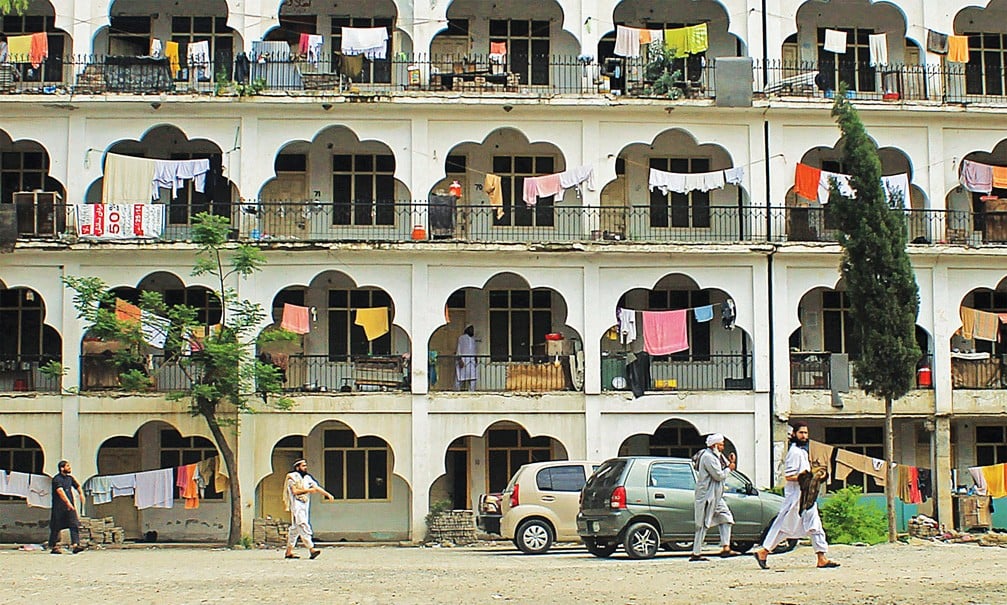
A profile of Darul Aloom Haqqania, one of the oldest Deobandi seminaries in Pakistan

An unusual and exorbitant Rs300 million grant for Darul Aloom Haqqania by Pakistan Tehreek-e-Insaf-led government in Khyber Paktunkhwa has created quite a stir in the country.
The ruling party has defended the action by saying it was an attempt to ‘mainstream’ the seminary. However, the beneficiary of the grant, Maulana Samiul Haq -- the chief of Darul Aloom Haqqania and a known father figure for Afghan Taliban -- has categorically said the grant is aimed at building new blocks of the school and nothing else.
Darul Aloom Haqqania, one of the oldest Deobandi seminaries in Pakistan, is situated in the old town of Akora Khattak in district Nowshera, a constituency of chief minister Pervez Khattak.
Akora Khattak, once associated with the great Sufi poet Khuskhal Khan Khattak, is better known for Darul Aloom Haqqania, famed for its role in training mujahideen for Afghan jihad in the late 1970s and ’80s.
Maulana Abdul Haq, a prominent Deoband cleric and founder of Darul Aloom Haqqania was studying in Darul Aloom Deoband in Saharanpur district, Uttar Pradesh, at the time of partition. After the partition, he founded Darul Aloom Haqqania in September 1947 on the pattern of Darul Aloom in India. In 1974 when the Ahmadi question came under discussion in the National Assembly, Maulana Abdul Haq was one of the leading figures to making that [anti-Ahmadi] movement a success.
Most of the Afghan Mujahideen leadership received inspiration from Haq’s addresses and decrees of jihad. The then president of Pakistan, military dictator Ziaul Haq awarded Sitara-e-Imtiaz (Medal of Distinction) to Maulana Abdul Haq in August 1981 -- in recognition of his ‘"achievements" and "services" for the country and religion. The Peshawar University also gave him an honorary degree of PhD in 1978.
Rahimullah Yusufzai, veteran journalist and political analyst, says: "In the 1970s, Maulana Maulana Abdul Haq defeated the then chief minister Nasarullah Khattak of Pakistan People’s Party from Nowshera. When Zulfikar Ali Bhutto asked Khattak how he lost elections despite being a chief minister, Khattak said, ‘because my rival was treated like a prophet’." However, Yusufzai says, the party’s new faction (JUI-S) under Samiul Haq, Haq’s son, has now lost its political grip and has less influence in masses.
Muhammad Amir Rana, security analyst and author of Jihad-e-Kashmir and Afghanistan has no doubts about the links of the seminary to Afghan jihad and extremism. "There is clear background of this seminary of fighting jihad in Afghanistan and openly supporting the fight against American and NATO forces in Kabul," he says. "There are groups in the seminary that support Takfiri ideology and back the activities of Tehreek-e-Taliban Pakistan."
After Maulana Abdul Haq died in 1988, his son Maulana Samiul Haq took charge of the seminary and continued to support the ideology and practice of jihad. Following the American invasion in Afghanistan after 9/11, the seminary supported the Afghan Taliban to oust foreign forces from an "Islamic country," Afghanistan. One of the most active groups of Afghan Taliban -- the Haqqani group -- comprises students of this seminary including its former chief Jalaluddin Haqqani. He put Haqqani with his name because of his certification from Darul Aloom Haqqania. Now his son Sirajuddin Haqqani is one of the deputies of Afghan Taliban.
The seminary, currently, has around 4,000 students including around 2,500 boarders. Darul Aloom Haqqania and Jamia Banori Town Karachi are the two biggest Deoband seminaries in the country at the moment.
The two suspects in the 2007 killing of former Pakistani Prime Minister Benazir Bhutto, according to media reports, had links with this seminary. However, Darul Aloom denies these allegations. Maulana Haq also heads a religio-political party Jamiat Ulema-e-Islam (Sami) parallel to another Deoband faction of JUI (Fazlur Rehman) in the province. JUI-F and PTI are political rivals and very critical of each other.
The KP government made a drastic cut in the funds for minorities. In the last year’s budgetary allocation made for the Department of Auqaf and Minority Affairs, 52.70 per cent was earmarked for the welfare of minorities in the Annual Development Programme in contrast with this year’s 23.49 per cent. Following the criticism on the PTI, party ministers visited the seminary and defended the grant recalling that the previous government of Awami National Party (ANP) in KP had provided Rs1.35 billion funds to mosques, particularly in the Mardan district.
Such grants and alleged bribes are nothing new. "Even the Awami National Party gave funds to mosques and seminaries in its electoral base in district Mardan," says Yusufzai. He says the current grant is huge and has political motives. "Though the grant is for building blocks of a high school in the seminary as well for running a madrassa, this has created a negative image of the PTI because of the seminary’s known ideology of jihad. The PTI was not expecting such reaction at all. Such grants are part of electoral politics in Pakistani political culture."
Political and security analyst Ayesha Siddiqa says the seminary is known for its association with radicalism and terrorism. "And it is also obvious this grant will not change their ideology but will help in their physical expansion. It will not be used for the students’ welfare. Such political bribes are always given in Pakistani politics."
The core problem is that our political parties have no realisation or sensitivity about these issues and the state has no programme about these organizations, she says. "That is why political parties and politicians continue to seek their votes in electoral politics," says Siddiqa.
"Mainstreaming is not possible in isolation and without large scale efforts for seminary and general education reforms," says Rana. "The grant has clear political motives, to please Samiul Haq against political rivals and get his support for street protests."
This is an edited version of the article printed on July 3, 2016